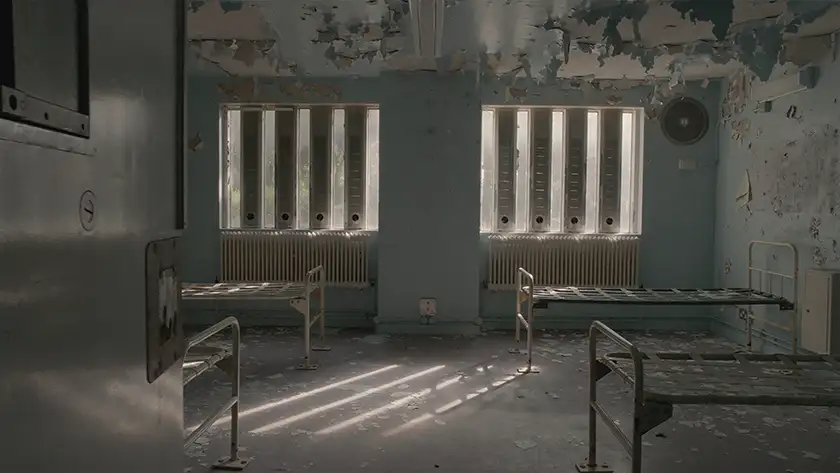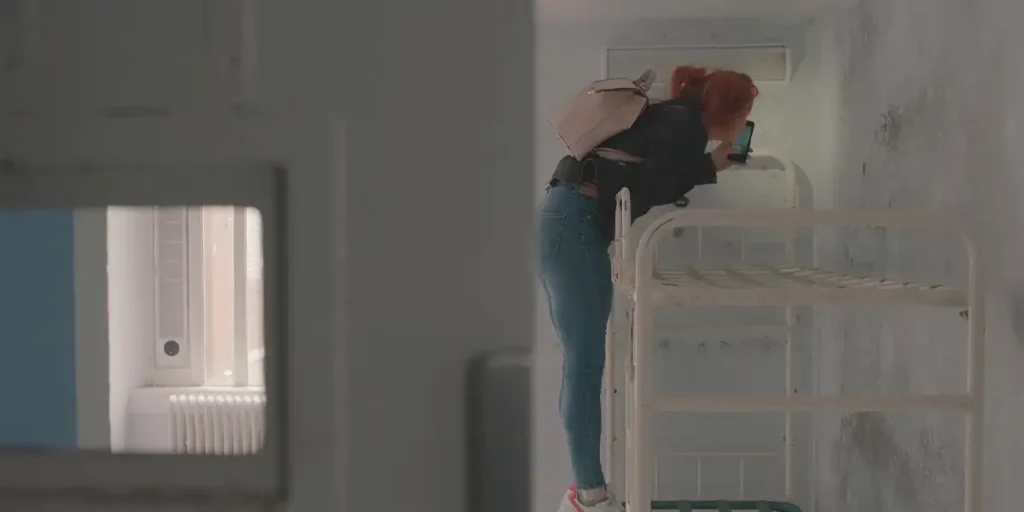Sophie Compton and Daisy-May Hudson’s film Holloway, where six former inmates return to the titular prison, teaches us that “women are powerful when they find their voice.”
Directors: Sophie Compton & Daisy-May Hudson
Genre: Documentary
Run Time: 85′
BFI London Film Festival World Premiere: October 11, 2024
U.S. Release Date: TBA
U.K. Release Date: TBA
“Women are powerful when they find their voice,” says one of the protagonists of Holloway at the end of the film, in a sentence that appropriately sums up the journey we watch them take in the movie. Holloway Prison was one of the largest women’s prisons in Europe, and Sophie Compton and Daisy-May Hudson’s film sees six former inmates return to the empty building before its demolition in 2016, and face the trauma they had been keeping buried for years.
From this synopsis alone, one would expect Holloway to focus on the women’s experiences in prison, but this is a different kind of documentary. In fact, it is more of a therapy session than a documentary, consisting, in part, of footage filmed by the women themselves, but mostly of recordings of a women’s circle they participate in for several days, in the prison’s former chapel, joined by a therapist. The end result is a film that works both as a psychological exploration of trauma and as example of how one should process and heal from it, even though it does raise some questions on whether the healing should have taken place on camera.
As a viewer, the most compelling aspect of Holloway is watching the six women at its center – Tamar Mujanay, Mandy Ogunmokun, Aliyah Ali, Sarah Cassidy, Gerrah Selby, and Brenda Birungi aka Lady Unchained – change completely as they come to terms with the emotions they had kept hidden for years, from shame and guilt to self-judgement and the cyclical nature of abuse, and are finally able to heal. On day one, halfway through a series of exercises that are meant to help them feel comfortable with each other, one of them reveals that “safety” is a trigger word for her, and we quickly realize that none of them feel safe in a group. Not only that, but some of them still think of the prison as a home, like Sarah, who feels nostalgic as she walks into the its empty rooms and explains that she’s sad that this “historical building” that meant so much to many people is going to disappear.
After only a few days spent with each other and the therapist who guides them through this journey, all of them start to realize that there’s something else they haven’t processed yet, and that the only way to deal with it is letting themselves feel it. Could the prison being demolished actually be part of that healing? As our six protagonists learn to be “safe from their lives” and face a history of abuse, they let go of these negative emotions, start to open up to the world and trust one another, and finally acknowledge that safety is something they needed all along.

As someone who has been in therapy, what I appreciated the most about Holloway is that it stands as an example of how one should process trauma, which makes it an important film particularly for people who don’t have access to this kind of support. As you watch Tamar, Brenda, Gerrah, Aliyah, Mandy and Sarah deal with what haunts them, you’ll really feel for them, even more so as the movie explains that they all took part in it willingly and some of them have now made it their career to help other women overcome abuse.
As an example of what therapy should look like for people who have dealt with trauma, Holloway is an effective and even moving watch. There are, however, a few aspects that prevent it from being truly great as a documentary, starting with its premise itself. The film’s focus is more on the women’s past before they went to prison than on HMP Holloway itself – and rightly so, as revealing more details on their prison life would have made it a completely different, more manipulative kind of film. Yet, at the same time, it also insists on making a statement about the criminal justice system, using the women’s stories to prove that they’re not to blame for what got them arrested, as they were victims of generational cycles of violence, neglect, abuse, and addiction. Since the film never really goes any further than this to make its point, this comes across as a simplistic view of a complex issue that would have needed to be explored in more depth.
As for the therapy aspect of the movie, there’s a point halfway through the film where one of the women asks for a particularly tough part of the session to take place off camera, and is pretty much denied her request. Later on, another woman leaves the circle to cry on her own and the film gives us access to that too by letting us hear the sound coming from her microphone. The movie makes it clear that all women were free to open up as much or as little as they wanted to, yet those scenes really make you question the morality of pushing someone to open up about such personal and painful issues on camera, and insisting on recording them even when they left the circle, at their most vulnerable, clearly needing some privacy.
In the end, Holloway means well, and if we focus on the therapeutic aspect of it – both for the six women involved and for other victims of abuse who haven’t yet processed their trauma – it is, without a doubt, an important documentary. The journey Tamar, Brenda, Gerrah, Aliyah, Mandy and Sarah decide to take is a moving and inspiring one, and it is bound to help others heal. I only wish the movie had allowed the women more time to process this trauma, on and off camera, and not used their stories to make a broader statement about justice.
Holloway had its World Premiere at the BFI London Film Festival on October 11, 2024 and will be screened again on October 15-20. Read our list of 30 movies to watch at the 2024 BFI London Film Festival!

